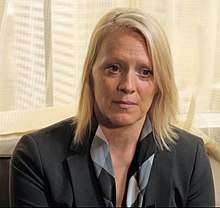Erin Kimmerle
Erin H. Kimmerle is an American forensic anthropologist, artist, and Executive Director of the Institute of Forensic Anthropology & Applied Science at the University of South Florida. She was awarded the 2020 AAAS Award for Scientific Freedom and Responsibility.
Erin H. Kimmerle | |
|---|---|
 Kimmerle speaks on the impact of the National Institute of Justice's "Solving Cold Cases with DNA" Program in 2017 | |
| Alma mater | University of Tennessee (PhD) University of Nebraska (MA) Hamline University (BA) |
| Awards | AAAS Award for Scientific Freedom and Responsibility, 2020 Hillsborough County Bar Association: Liberty Bell Award, 2017 |
| Scientific career | |
| Institutions | University of South Florida |
| Thesis | Biological and Statistical Variation in Age Estimation from Pubic Symphyseal Morphology with Regard to Individual Identification and Demographic Profiling (2004) |
| Website | www |
Early life and education
Kimmerle studied anthropology at Hamline University and graduated in 1994.[1] She worked as an osteologist at Hamline University until 1996, when she returned to her academic studies. She moved to the University of Nebraska–Lincoln for her graduate studies, before earning a doctoral degree at the University of Tennessee.[2] In 2001 Kimmerle was part of a United Nations forensic team, where she worked as chief anthropologist studying mass graves in Kosovo, Bosnia and Herzegovina, Bermuda and Croatia.[3][4] She also worked in Peru and Nigeria where she helped locate mass graves, identified unknown victims and conduct research on human identification methods.[3]
Research and career
Kimmerle joined the University of South Florida (USF) in 2005. She was promoted to Assistant Professor in 2008 and Associate Professor in 2012. She is the Founder and Executive Director of the Institute of Forensic Anthropology (IFAAS), which has expanded considerably under her leadership.[3]
At USF, Kimmerle led a four-year excavation of the infamous reform school Florida School for Boys. Despite several other researchers being unwilling to excavate the school, Kimmerle launched the first investigation in 2012, uncovering unmarked graves of students.[5] She was given permission by the Florida Cabinet and started a year-long dig.[5] Her research involves the use of ground-penetrating radar and routine excavation techniques, including skeletal analysis. During the four-year dig, Kimmerle found the remains of 51 boys who had previously been labelled as missing.[6] She demonstrated that the students of the Florida School for Boys had suffered from sexual abuse, starvation and beatings.[5][7] Kimmerle used DNA analysis to identify the bodies of eight of the students, who were returned to their families and appropriately buried.[5][8] Her investigations have been supported by National Institute of Justice, who funded Kimmerle to review unsolved deaths.[1] In 2015 she delivered a TED talk on forensic science and human rights.[9] In 2019 she was involved with a study of remains that could have belonged to Amelia Earhart.[10] In 2020 she launched an investigation into forgotten grave sites across Hillsborough County, Florida.[11]
In 2020 Kimmerle was awarded the 2020 AAAS Award for Scientific Freedom and Responsibility.[5][12]
Selected publications
- Kimmerle, Erin H. (2008). Identification of Traumatic Skeletal Injuries Resulting from Human Rights Violations and Modern Warfare: Identification of Injuries Resulting from Human Rights Abuse and Armed Conflict. 2008. ISBN 978-0849392696.
- Kimmerle, Erin H. (2008). Skeletal Trauma: Identification of Injuries Resulting from Human Rights Abuse and Armed Conflict. 2008. ASIN B00A8SN96Q.
- Kimmerle, Erin H. (2008-02-11). "Sexual Dimorphism in America: Geometric Morphometric Analysis of the Craniofacial Region". Journal of Forensic Sciences. doi:10.1111/j.1556-4029.2007.00627.x.
References
- "New Prints for Soeffker Gallery | Hamline University Newsroom". www.hamline.edu. Retrieved 2020-02-04.
- "USF | Anthropology | People | Kimmerle". www.usf.edu. Retrieved 2020-02-04.
- Tuesday, Janan Talafer |; April 17; 2012. "USF Researcher Solves Crimes, IDs People From Bones, Tampa". 83Degrees. Retrieved 2020-02-05.CS1 maint: numeric names: authors list (link)
- Kimmerle, Erin H.; Baraybar, Jose Pablo (2008-02-19). Skeletal Trauma: Identification of Injuries Resulting from Human Rights Abuse and Armed Conflict. CRC Press. ISBN 978-1-4200-0911-8.
- "Discovery of Unmarked Graves Earns 2020 AAAS Scientific Freedom and Responsibility Award". American Association for the Advancement of Science. Retrieved 2020-02-04.
- Dailey, Kate (2014-04-16). "Exhuming remains at Florida school". BBC News. Retrieved 2020-02-05.
- ""A real mystery": More possible graves uncovered at notorious shuttered reform school?". www.cbsnews.com. Retrieved 2020-02-05.
- Florida, News Service of. "No Additional Remains Found At Dozier School For Boys". wusfnews.wusf.usf.edu. Retrieved 2020-02-04.
- Forensics and human rights | Dr. Erin Kimmerle | TEDxCarrollwoodDaySchool, retrieved 2020-02-05
- Holton, Jennifer (2019-10-14). "USF's Erin Kimmerle testing human remains that may belong to Amelia Earhart". FOX 13 News. Retrieved 2020-02-04.
- "USF researchers to help Hillsborough County search for forgotten gravesites". WFTS. 2020-01-23. Retrieved 2020-02-04.
- "Recipients of the AAAS Award for Scientific Freedom and Responsibility". American Association for the Advancement of Science. Retrieved 2020-02-04.